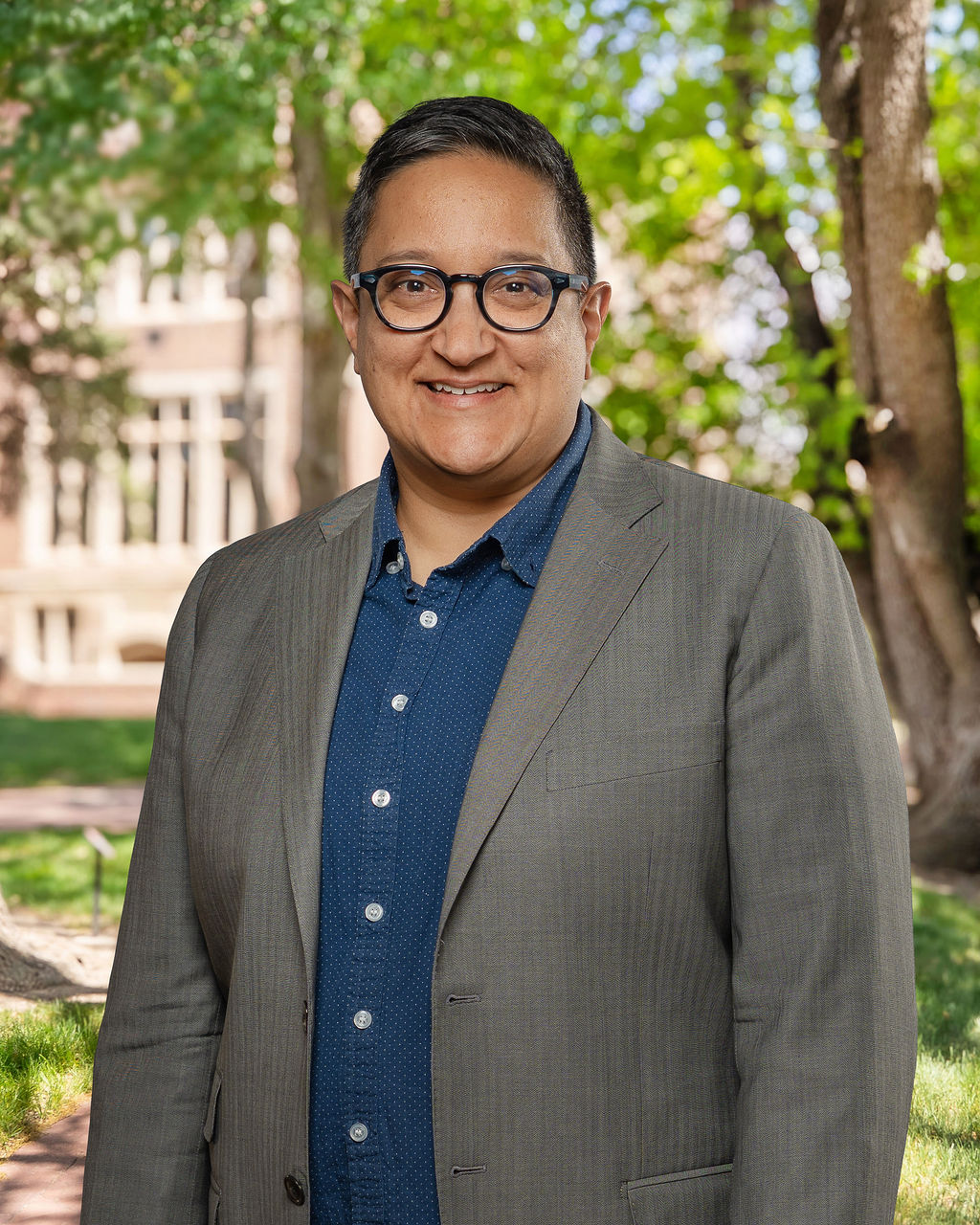Colorado Free App Days are here! CO residents can apply FOR FREE October 7-9. Apply now!
Menu
Colorado Free App Days are here! CO residents can apply FOR FREE October 7-9. Apply now!

Professor
Associate Dean for Faculty Affairs
Director, Scrivner Institute
Naazneen H. Barma is the Scrivner Professor of Public Policy, Associate Dean for Faculty Affairs, and the founding Director of the Scrivner Institute of Public Policy at the University of Denver’s Josef Korbel School of Global and Public Affairs. She is a political scientist whose research focuses on peacebuilding, foreign aid, international development, and global governance, with regional expertise in Southeast Asia and the Pacific. She teaches courses on public policy, political economy, and international development. Dr. Barma’s research has been supported by the Carnegie Corporation of New York, the U.S. Institute of Peace, the Minerva Research Initiative, and the Berggruen Institute, among others. She is, most recently, author of The Peacebuilding Puzzle: Political Order in Post-Conflict States (Cambridge University Press 2017) and co-editor of The Political Economy Reader: Contending Perspectives and Contemporary Debates (Taylor & Francis 2022). Dr. Barma was a professor in the Department of National Security Affairs at the Naval Postgraduate School from 2010–2020 and previously a development practitioner at the World Bank, where she worked for six years on governance and institutional reform in the East Asia Pacific Region. She is a founder and a Principal of Bridging the Gap, a grant-funded initiative devoted to enhancing the policy impact of contemporary international affairs scholarship.
Show more
Sié Center, Scrivner Institute
Public Policy
Barma, Naazneen H. and Steven K. Vogel, eds. 2022. The Political Economy Reader: Contending Perspectives and Contemporary Debates. (2nd edition) New York: Routledge.
Barma, Naazneen H. 2017. The Peacebuilding Puzzle: Political Order in Post-Conflict States. Cambridge: Cambridge University Press.
Barma, Naazneen H., Elisabeth Huybens, and Lorena Viñuela, eds. 2014. Institutions Taking Root: Building State Capacity in Challenging Contexts. Washington, DC: The World Bank.
Barma, Naazneen H., Kai Kaiser, Tuan Minh Le, and Lorena Viñuela. 2012. Rents to Riches? The Political Economy of Natural Resource-Led Development. Washington, DC: The World Bank.
Barma, Naazneen H. and Steven K. Vogel, eds. 2008. The Political Economy Reader: Markets As Institutions. New York: Routledge.
Avant, Deborah, Naazneen H. Barma, George F. DeMartino, and Ilene Grabel. 2024. "The Ethics of Engaged Scholarship in a Complex World." International Affairs 100 (1), January 2024: 159-180.
Barma, Naazneen H. 2023. "Collective Mentoring as a Tool for Inclusion." in Maria Rost Rublee, Constance Duncombe, George Karavas, Naazneen H. Barma, Cecilia Idika-Kalu, Arturo C. Sotomayor, Mariana Kalil, and Hye Yun Kang, "Promoting Diversity and Inclusion in Professional Associations: Experiences from Security Studies." International Studies Perspectives: 125-128.
Tama, Jordan, Naazneen H. Barma, Brent Durbin, James Goldgeier, and Bruce W. Jentleson. 2023. "Bridging the Gap in a Changing World: New Opportunities and Challenges for Engaging Practitioners and the Public." International Studies Perspectives 24 (3): 285-307.
Barma, Naazneen H. and James Goldgeier. 2022. "How Not to Bridge the Gap in International Relations." International Affairs 98 (5), September 2022: 1763-1781.
Barma, Naazneen H. 2021. "Do Petroleum Rents Fuel Conflict in Developing Countries? A Case Study of Political Instability in Timor-Leste." Energy Research & Social Science 75, May 2021.
Barma, Naazneen H., Naomi Levy, and Jessica Piombo. 2020. "The Impact of Aid Dynamics on State Effectiveness and Legitimacy." Studies in Comparative International Development 55 (2), June 2020: 184-203.
Barma, Naazneen H., Naomi Levy, and Jessica Piombo. 2017. "Disentangling Aid Dynamics in Statebuilding and Peacebuilding: A Causal Framework." International Peacekeeping 24 (2), April 2017: 187-211.
Barma, Naazneen H., Brent Durbin, Eric Lorber, and Rachel E. Whitlark. 2016. "Imagine a World in Which: Using Scenarios in Political Science." International Studies Perspectives 17 (2), May 2016: 117-135.
Barma, Naazneen H. 2014. "The Rentier State at Work: Comparative Experiences of the Resource Curse in East Asia and the Pacific." Asia & the Pacific Policy Studies 1 (2), May 2014: 257-272.
Barma, Naazneen H. 2012. "Peacebuilding and the Predatory Political Economy of Insecurity: Evidence from Cambodia, East Timor, and Afghanistan." Conflict, Security & Development 12 (3), July 2012: 273-298.
Barma, Naazneen H., Giacomo Chiozza, Ely Ratner, and Steven Weber. 2009. "A World Without the West? Empirical Patterns and Theoretical Implications." Chinese Journal of International Politics 2, October 2009: 577-596.
Barma, Naazneen H. 2006. "Brokered Democracy-Building: Developing Democracy Through Transitional Governance in Cambodia, East Timor, and Afghanistan." IJMS: International Journal on Multicultural Societies 8 (2), Fall 2006: 127-161."
Honoree, U.S. National Security & Foreign Affairs Leadership List, Center for Strategic and International Studies (CSIS) and the Diversity in National Security Network (2022).
Korbel Outstanding Teaching Award, Josef Korbel School of Global and Public Affairs, University of Denver (2022). A student-nominated award presented to a faculty member who exemplifies Korbel's commitment to students both inside and outside the classroom.
Susan S. Northcutt Award, Women's Caucus for International Studies, International Studies Association (2021). Recognizes a person who actively works towards recruiting and advancing women and other underrepresented scholars in the profession, whose spirit is exceptionally inclusive, generous, and conscientious, and who has made significant contributions to the field of international studies through outstanding scholarship, teaching, and mentoring.
Introduction to Public Policy (Graduate)
International Development Policy and Practice (Graduate)
Ph.D., Political Science, University of California, Berkeley, 2007
M.A., Political Science, University of California, Berkeley, 2002
M.A., International Policy Studies, Stanford University, 1997
B.A., International Relations and Economics, Stanford University , 1996
Copyright ©2025 University of Denver | All rights reserved | The University of Denver is an equal opportunity institution